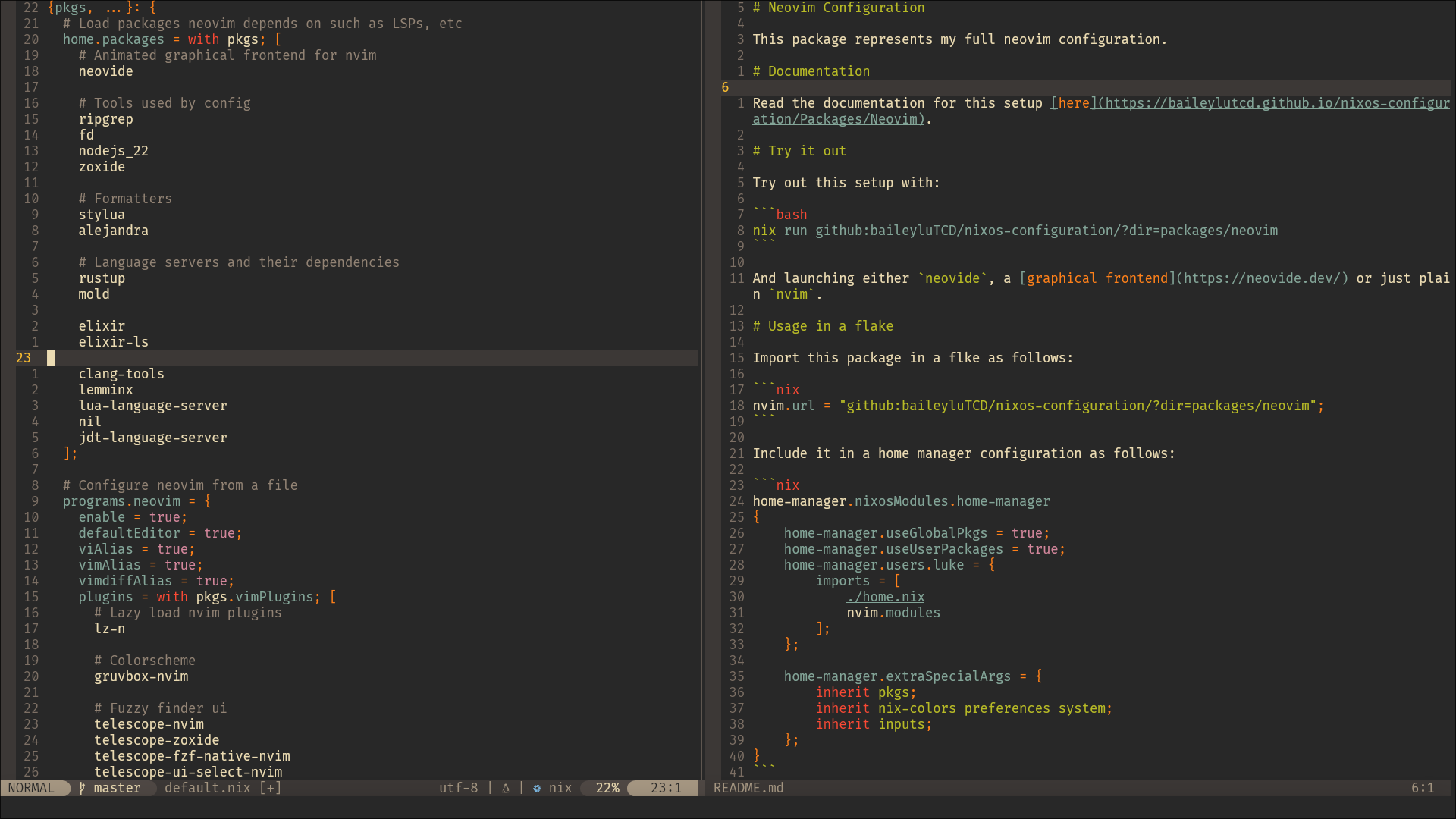The neovim package describes an entire neovim configuration in a declarative manner.
View the code for this package here.

Package Management with Nix
While neovim has many package managers to choose from, such as packer or lazy, we already have access to the world’s largest package manager, nixpkgs. Hence, we want to try find a way to declare all of our dependencies for neovim using nix because it meshes far better with our existing system configuration and eliminates duplicate dependencies.
Options
To achieve this, we have a number of options to choose from:
- The popular nixvim, which allows for configuration of neovim in pure nix without relying on lua or vimscript.
- Using the built in neovim
programand manually configuring neovim
We will opt to use the built in neovim program and attach our own lua configuration ourselves.
Selecting Default Neovim
While it may seem tempting to use nixvim and attempt to configure everything in nix, I believe this is a bad idea for a few reasons:
- It requires a double configuration of sorts where you often find yourself reading a package’s native lua documentation and having to find a way to translate it back to neovim
- Many packages either do not have exposed nixvim configuration meaning you will have to write lua in inlined strings in your nix configuration, foregoing the benefits of LSPs and formatters.
- Worse still, many slightly lesser known packages do not exist on the nixpkgs registry full stop, making them much harder to use with nixvim, while the original vim and neovim packages have a convenient method for importing packages via git.
Configuring neovim with lua
In order to configure neovim with lua we can simply create a regular init.lua file and symlink it into our home directory with nix, while declaring package dependencies in nix.
To do this, a nix derivation is an appropriate way of wrapping the nvim binary such that it always launches with your configuration.
{
pkgs,
name,
version,
...
}: let
lib = pkgs.lib;
# Packages needed for running various functions (LSPs, etc)
packages = with pkgs; [
# Tools used by config
ripgrep
fd
nodejs_22
zoxide
direnv
];
# Nvim Plugins to make avalible
plugins = with pkgs.vimPlugins; [
lz-n
gruvbox-nvim
telescope-zoxide
];
# Produce a valid vim packpath from the plugins list
packpath = pkgs.runCommandLocal "packpath" {} ''
mkdir -p $out/pack/${name}/{start,opt}
${
lib.concatMapStringsSep
"\n"
(plugin: "ln -vsfT ${plugin} $out/pack/${name}/start/${lib.getName plugin}")
plugins
}
'';
in
pkgs.stdenv.mkDerivation {
name = name;
version = version;
src = ./src;
# Inputs for wrapping program
nativeBuildInputs = with pkgs; [
makeWrapper
];
# This wrapper adds our plugins to the nevim package path
# And points the configuration to the init.lua in ./src bundled
# With the derivation
buildPhase = ''
export NVIM_DIR=$out/bin
mkdir -p $out/bin
makeWrapper "${pkgs.neovim-unwrapped}/bin/nvim" $out/bin/${name} \
--add-flags "--cmd 'set packpath^=${packpath} | set rtp^=${packpath}'" \
--add-flags "--cmd 'set rtp^=$out/bin'" \
--add-flags "-u '$out/bin/init.lua'" \
--prefix PATH : ${lib.makeBinPath packages}
'';
installPhase = ''
cp -r $src/* $out/bin
'';
}
This will effectively copy all files in ./src into the neovim config directory, so you can put whatever you like in there to configure neovim.
Lazy Loading
To quote the README of lz.n, our lazy loading plugin:
It should be a plugin author’s responsibility to ensure their plugin doesn’t unnecessarily impact startup time, not yours!
Regardless, the current status quo is horrible, and some authors may not have the will or capacity to improve their plugins’ startup impact.
As such it is common practice to lazy load plugins in neovim manually. Typically, a neovim user will use the lazy package manager to achieve this, but we do not need a package manager so we will use lz.n for this purpose instead.
To summarise it’s documentation, lz.n provides a simple plugin management API:
- Everything in
lua/plugins(relative toinit.lua) will be scanned for plugin declarations - Plugins can be declared with an
eventwhich states when they will be loaded. Common events include:DeferredUIEnter→ Load plugin after the UI has been loadedUIEnter→ Load plugin before the UI is loaded- Other lesser used events can be read about by running
:h eventsin editor
- Plugins declare an
aftercallback for after the plugin is loaded where items such as creating key binds or configuring the plugin are performed.
Here is an example of my configuration for oil.nvim:
return {
'oil.nvim',
event = 'DeferredUIEnter',
after = function()
require('oil').setup {
default_file_explorer = true,
prompt_save_on_select_new_entry = true,
watch_for_changes = true,
view_options = {
show_hidden = true,
},
}
-- Enable navigating out of a file
vim.keymap.set('n', '-', '<CMD>Oil<CR>', { desc = 'Open parent directory' })
end,
}Full Configuration
The full configuration can be found here, which has been documented to be the best of my ability. I recommend having a look over it, or trying it out with:
nix run github:baileyluTCD/nixos-configuration/?dir=packages/neovimAnd launching either neovide, a graphical frontend or just plain nvim.
See also
- This tutorial provides a more fully featured approach to making a custom nix powered nvim wrapper.